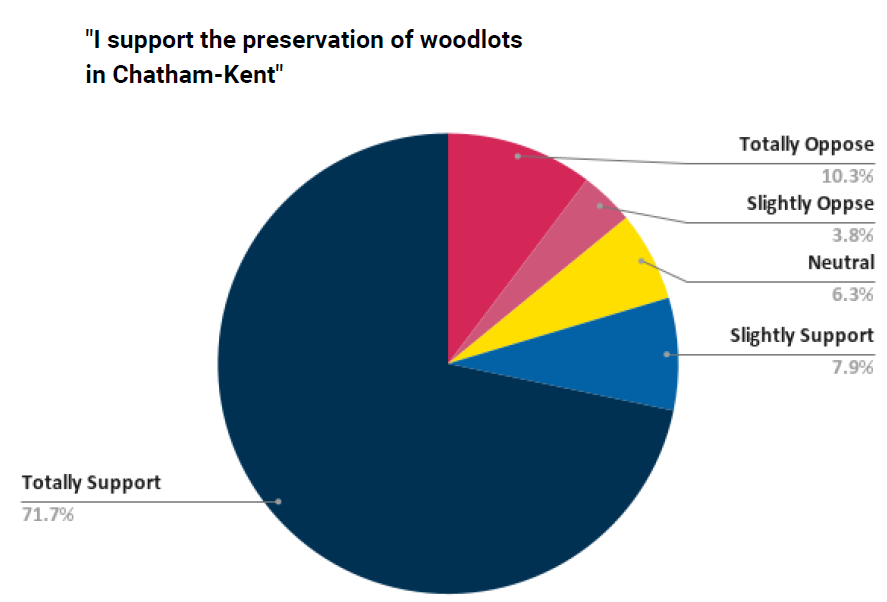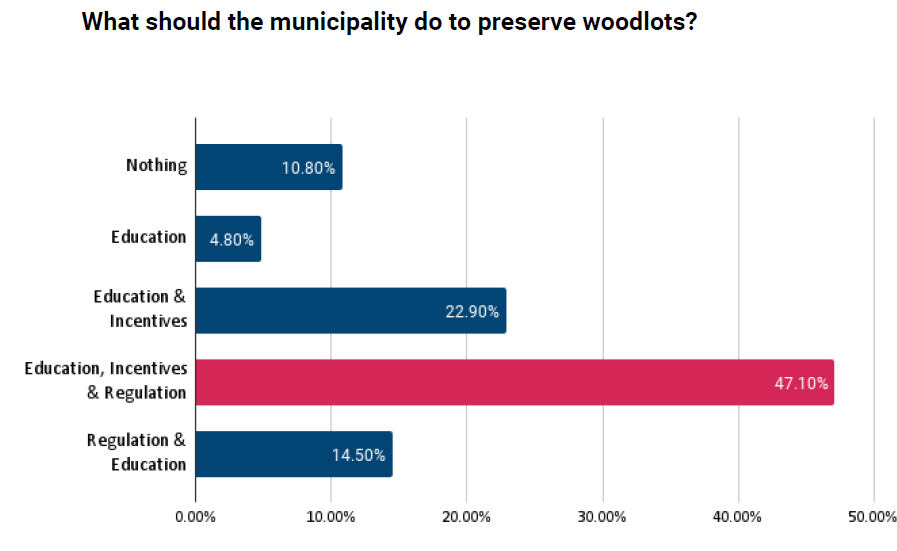

Finding a clear direction on a hotly contested issue
Chatham-Kent needed a way to successfully engage residents in a meaningful manner in discussing options to support the preservation and health of woodlots located on private properties; a recurring issue that has generated controversy in the community.
Ethelo’s comprehensive engagement plan increased participation and provided all participants with an opportunity to voice their opinions. A supplementary process was also undertaken to validate and verify the integrity of the results against any possible attempts to influence the outcome. With the results generated from the Ethelo eDemocracy platform, the municipality was able to provide Council with comprehensive public input to support Council’s deliberations.
> 1500
Participants
3500
Comments

Manager, Growth & Sustainability, Chatham-Kent
The preservation and health of woodlots located on private properties has been a recurring issue in Chatham-Kent, Ontario, which is one of only a few municipalities in southern Ontario that does not have a forest conservation bylaw in place to regulate tree removal on private woodlots. This has been an ongoing issue for many years, which most recently resurfaced in the spring of 2021 due to several clear-cutting activities.
“The topic of forests and woodlots has historically been, and continues to be politically sensitive in Chatham-Kent. The issue is characterized by complexity which is due in part to the diversity of views present in the community, the existence of a multitude of factors, competing pressures, potential courses of action, and the impacts that might be felt by different segments of the community depending on how the issue is ultimately dealt with by Council.” Gabriel Clarke, Manager, Growth & Sustainability, Planning Services.
In April 2021, Council passed a temporary tree removal bylaw prohibiting clear-cutting on private woodlots, and directed administration to launch a full public engagement process to gather residents’ input on options that encompassed the full spectrum of woodlot preservation tools including education, incentives, and regulations. Council directed that an online engagement platform be used due to the COVID-19 gathering restrictions in place at the time. Chatham-Kent administration preferred a platform that provided an engaging user interface, diverse opportunities to share information with participants, and a suite of tools that offered the ability to present questions in a variety of formats depending on the nature of the question. Other top considerations included ensuring that the engagement was robust, fully transparent and was accessible to multiple segments of the community..
“Given the controversial nature of the topic and the goal of providing an enriched experience for our residents that included sharing information, as well as offering engaging ways to present questions to participants, we selected Ethelo as the best choice to host the engagement. We also used their social media promotion services to increase awareness of the opportunity to provide input on this.” Clarke

Ethelo’s eDemocracy platform provided a more comprehensive, transparent, and secure engagement process than a standard survey. This was important in ensuring that residents and Council were confident that the results accurately represented the community’s views.
Working with members of the Municipality’s Community Development Department, the Ethelo team designed and implemented a comprehensive engagement plan that promoted the engagement, and provided the community with multiple opportunities to provide input. This included both the online engagement format and a virtual world cafe style workshop or “salon politique” that Ethelo facilitated.
This engagement helped inform the community about the spectrum of potential options to support woodlot preservation and ensured that residents had the opportunity to voice their opinions. The engagement was structured to seek community input on the following:
“It was important to understand the community’s general views and priorities on all the possible municipal tools for supporting the health and preservation of woodlots, in relation to woodlots on private properties. We also wanted to gather community input on some of the more specific details of how each tool might be configured should Council decide to move forward with one or more of them.” Clarke

More than 1,500 people participated online, and approximately 60 joined the world cafe online discussion for more than two hours to listen and share their thoughts on supporting the health and preservation of woodlots. The results indicated that the majority of participants were in favour of possible strategies to support the health and preservation of woodlots that included all three pillars of education, incentives and regulation.
Participants’ feedback also underscored the importance of respecting land-owner rights in any regulations to ensure a minimal toll and maximum reward associated with the ownership of well-maintained and moderately farmed woodlots. There was also agreement that the municipality should work closely with both landowners and environmental experts when implementing any woodlot management strategies.
Through Ethelo’s multi-faceted approach and focus on eDemocracy, administration was able to provide Council with comprehensive community input to help inform and support future decisions around this highly controversial issue.
Throughout the online engagement process and afterwards, a number of allegations were made about the possibility of coordinated efforts to influence the results of the engagement through multiple online responses and/or submissions by non-residents. In response, Chatham-Kent requested that Ethelo produce a security report.
The security analysis included, but was not limited to, device IDs and IP addresses as well as attempts to obscure that information, and patterns of activity on the platform. Various techniques were incorporated to determine the location of participants, as well as attempts by individuals to submit more than one entry. An analysis of user-generated data was also completed to identify patterns associated with fraudulent activity.
Using this information, Ethelo was able to identify potentially suspicious behaviour and undertook a deeper level of analysis to look for patterns of organized activity within this data. This included looking for unusual levels of participation from certain segments.
The results indicated that there were a number of attempts to undermine the results of the online engagement. These attempts were identified and blocked during the data validation stage, and the suspicious votes were not included in the final report.
“The analysis conducted as part of the security report provided a means to identify and screen out any inauthentic entries from the results of the engagement. This helped to give us the confidence that the results we presented to Council and the public represented the aggregate views of the participants.” Clarke

“I appreciated the detail put into how to answer the questions; that they weren’t all just ‘yes’ and ‘no’ answers. Someone did their homework and challenged our minds!”
Gabriel Clark